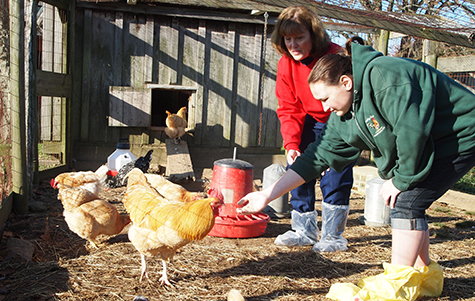[June 30, 2016; Kennett Square, PA] -- With an outbreak of Salmonella illness attributed to backyard poultry flocks in the United States, Penn Vet offers 12 important tips to keep people and their poultry safe this summer.
The Centers for Disease Control and Prevention (CDC) reported that between January 4 and May 11, 2016, 324 people in 35 states—including Pennsylvania—were sickened by Salmonella, and more than 90% of those interviewed reported recent contact with backyard poultry. Of the 324 people, 88 (27%) were children ages five or younger.
On July 19, 2016 the CDC issued an update: the number of people infected with Salmonella increased to 611 cases in eight outbreaks under investigation. Illness was reported from 10 additional states, bringing the total to 45 states.

Agriculture Spokesperson Dr. Sherrill Davison is the Director of the Laboratory of Avian Medicine and Pathology at Penn Vet’s New Bolton Center, with more than 30 years of experience caring for poultry and studying their diseases. She offers the following advice:
Tips for purchasing and managing poultry
1. Purchase: Buy chicks from a reputable company and request a certificate that they have been vaccinated for Marek’s Disease.
2. Quarantine: Keep new birds away from the flock for three weeks to make sure they are not sick.
3. Safety: Set up the coop so predators cannot enter.
4. Bedding/Litter:
• Pine shavings are preferred, and should be changed at least every two weeks.
• Straw or hay is acceptable, but should be changed at least once a week.
• Bedding should be clean and dry.
5. Food and water: Food should be appropriate for the bird type and age, and should be purchased from a feed store. Always provide clean water.
6. Daily observation:
• Look for attitude changes (e.g., if they are listless or hiding)
• Handle them and feel their bodies to determine if they are losing weight
• Check to make sure they are eating and drinking
Tips to prevent the spread of disease
1. Wash your hands every time you come into contact with the birds.
2. Wear dedicated footwear when working with the birds. Remove this footwear before entering your home.
3. Clean equipment and tools regularly.
4. Separate birds that seem to be sick.
5. Do not bring the birds into your home.
6. Do not have birds near food to be consumed by humans.
While Davison’s tips can help prevent the spread of Salmonella, which sickens people but may not cause disease in birds, they can also help prevent the spread of other prevalent avian diseases.
New Bolton Center’s lab has seen an increase in two diseases in backyard poultry flocks over the past two years: Marek’s Disease, an untreatable virus that causes tumors, weight loss, and paralysis, which can be reduced with vaccinations; and Mycoplasma, a bacterial-like respiratory disease that will decrease egg production, which can be treated with antibiotics, but will be carried by the bird for life.
Poultry owners with questions should call their veterinarian or Penn Vet’s Laboratory of Avian Medicine and Pathology: 610-444-4282.